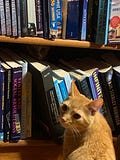Home is a place you don’t choose until you do
There’s an intersection two blocks from my apartment where I find myself frequently. It’s at the end of Adams Morgan, or the beginning, depending on where you’re coming from. I find myself there often because of the magic stoplight. No matter where I’m coming from or where I’m going, what time or day or night, the crosswalk light is always, always, always red. And I mean recently red. It always turns red just before I arrive, as if my very own toeprints flip a trigger. For thirty to sixty seconds, at the corner of 18th and Columbia, I’m forced to stop, stretch, look up, look around.
It’s not a particularly noteworthy intersection. There are a couple off-kilter t-shirt shops, a religious bookstore, and mysterious cafes sandwiched between bougie restaurants. Sometimes — rarely — there are buskers. I find myself wondering about the robots who named a hair salon ASUKISQ. I saved an injured pigeon there once. And most recently, I find myself thinking of this intersection when I think of DC— specifically, when I think a comforting thought: that to me, DC feels like home.
Have I told you about Harpers Ferry? I love Harpers Ferry. I used to be forced there for work retreats. It’s the city at the conjunction of two great rivers, and where Maryland, Virginia, and West Virginia meet. So I keep going back and, no matter what’s going on with work, when I’m able to run along the Potomac, I feel at peace. This Potomac feels different than the DC Potomac. It’s wider and carved in a green mountain valley. You can feel the weight of the river in Harpers Ferry. You can see how it shaped lives and worlds. It literally carved itself a valley between mountains. The mountains are very old, which means they’re not as impressive as other mountains elsewhere.
Harpers Ferry is no Rockies. It’s no Everest. It is what it is: a historic city at the confluence of two great rivers, both of which have buoyed my bottom in the cold caress of an inner tube, and both of which have licked up my sweat after a buggy hike, and laughed as I fled the wrath of a goose. I was forced to Harpers Ferry for work, and then I chose to go there, many times, and each time, it’s a return home.
There’s a lake by my mom’s house in Madison. Lake Wingra. It’s small enough to run around and full of green muck that gets stuck on your canoe. It’s two blocks from the temple I went to growing up. I have vague, awkward memories of feeling too antsy to sit still through Yom Kippur services, and insisting upon a need to use the bathroom, unleashing me from the pews to roam the hallways instead, where I could examine all the rabbis who’ve ever rabbied those very pews, those very halls. Lake Wingra is where we went after the Yom Kippur service — the most downer holiday of the year — to feel guilty, then cast away our sins as seeds, straight into the stomachs of some very spoiled ducks who don’t worry about the wicked valences of their food.
I didn’t care too much about this lake when I was young. My strongest memories there are the yearly bummer Yom Kippur, and the time a bird pooped on my head. But it’s been a constant. As my dad died, as my family switched houses, as my brothers moved out, as my mom moved towns, there has always been this lake, and now, when I return home to Madison, the return doesn’t feel complete until I sit on its shores.
I think it matters that I resisted these places before I accepted them. All the places that are easy to love have too many people loving them already. There is something important about discovering a place all your own. Or at least feeling like you discovered it.
I find myself there often. So often when I’m running or walking, my mind is somewhere else. But when forced to stay still, something strange happens. The mind has to stop running on its own loops and look around. Is that what it is to be home? To feel at home in your own body, in your own mind. To be in a mental state where you can appreciate the bad music from the street corner over there, or the power of the river that carried history through the centuries, or the calmness of a duck wishing for sin-seeds. To be able to turn to the person next to you, or say to no one at all, speaking into the air just to hear your own voice say, “I’m home.”
-Denise
There are two kittens in each of these photos. Can you spot them all?




